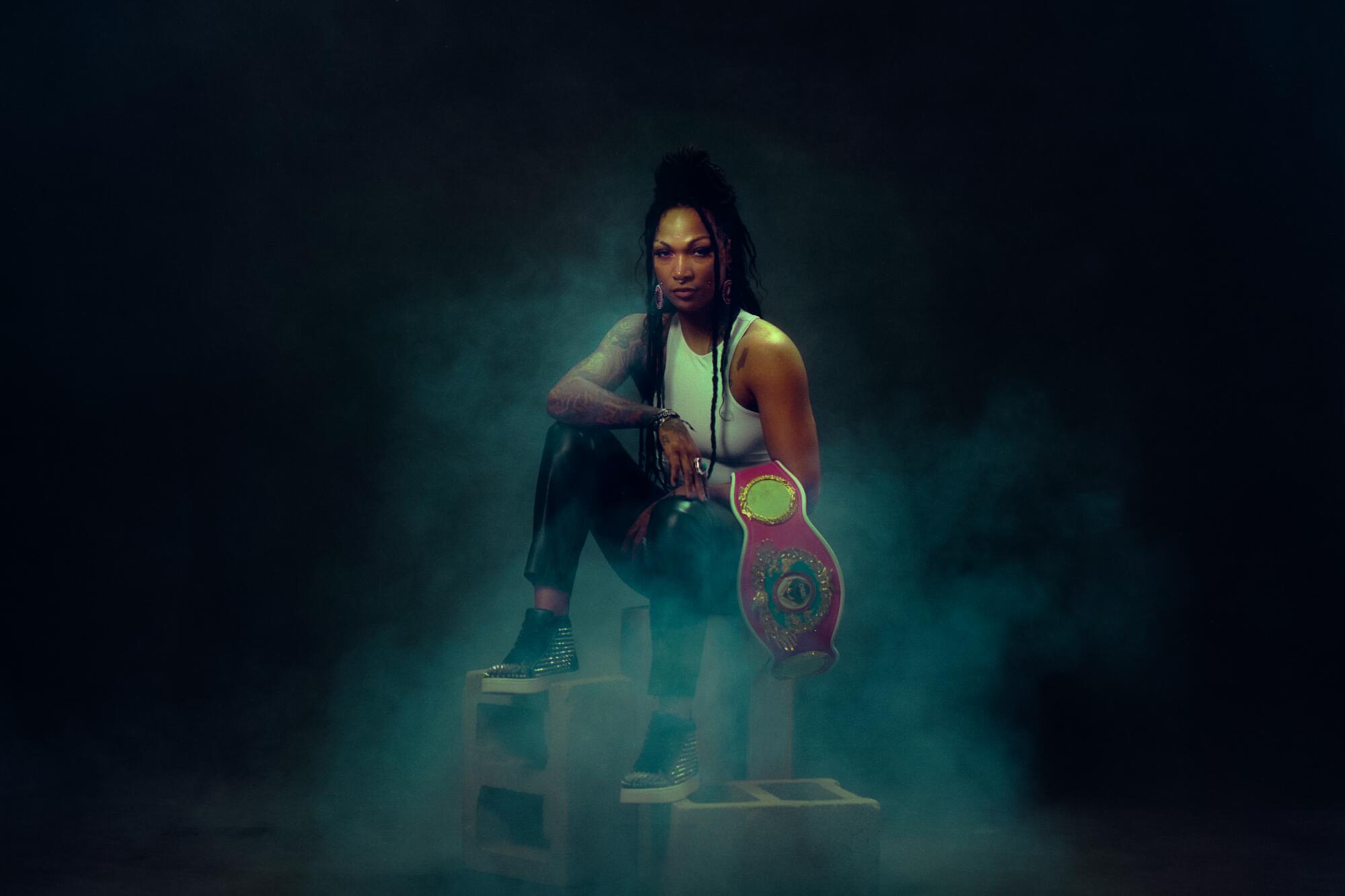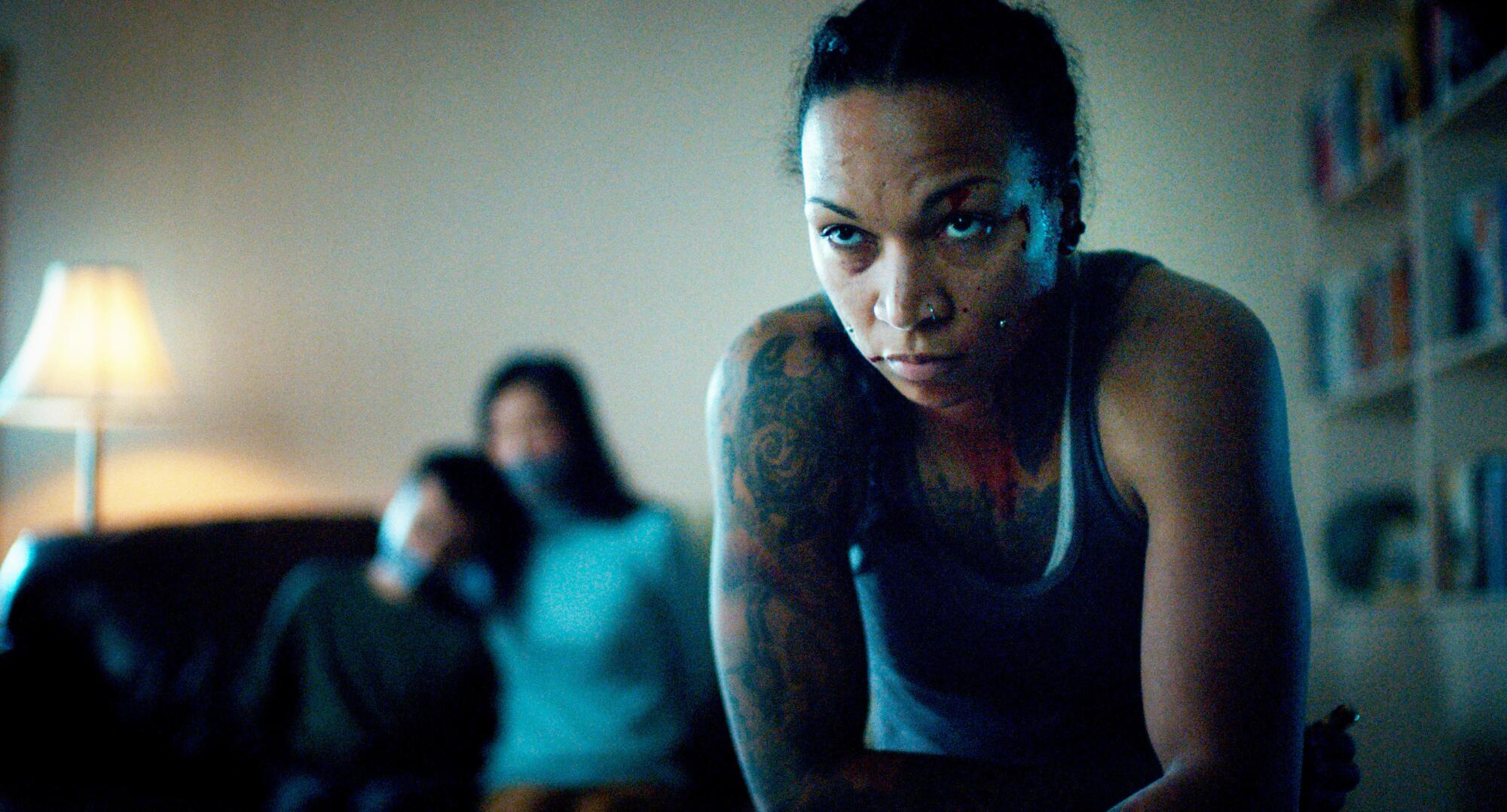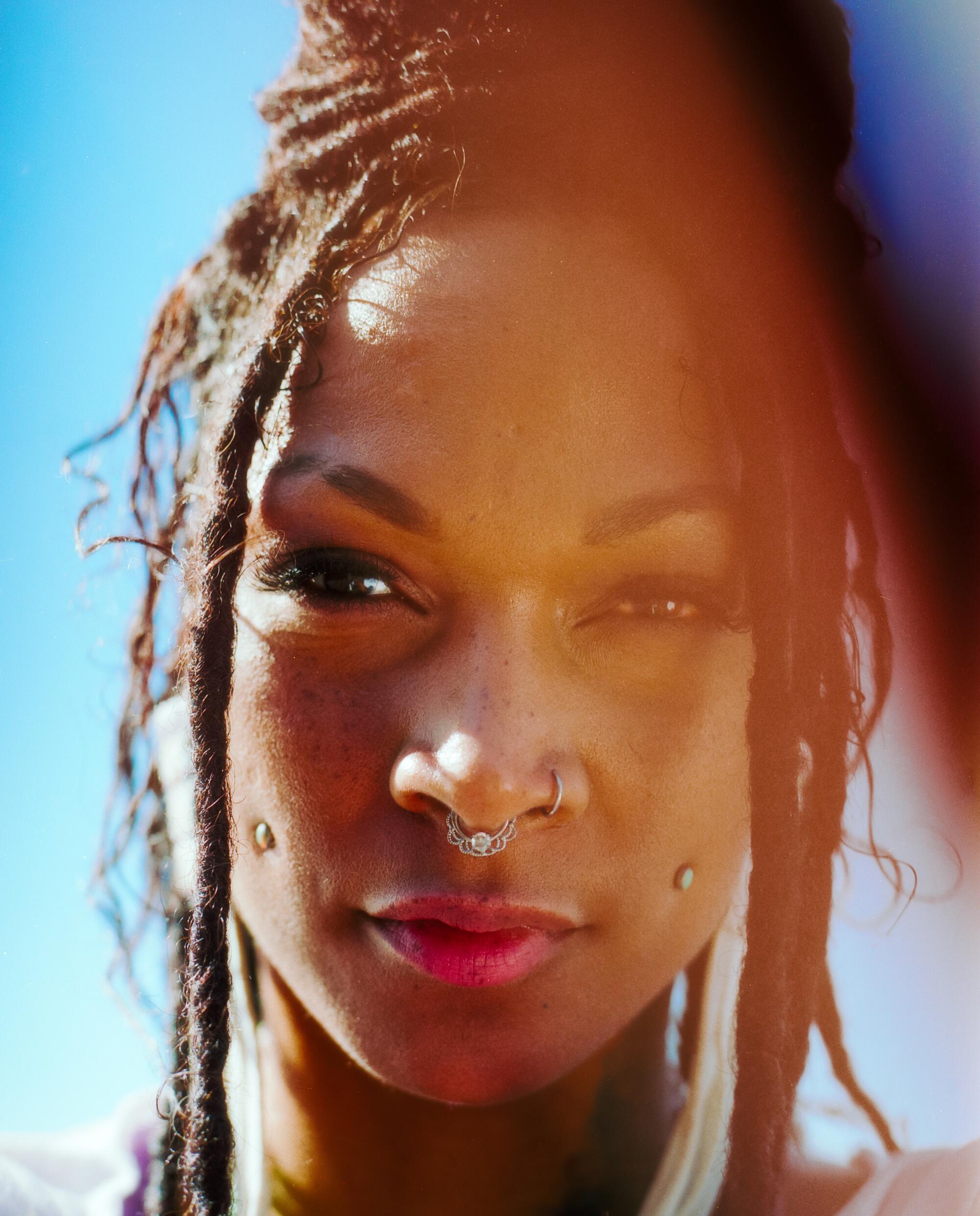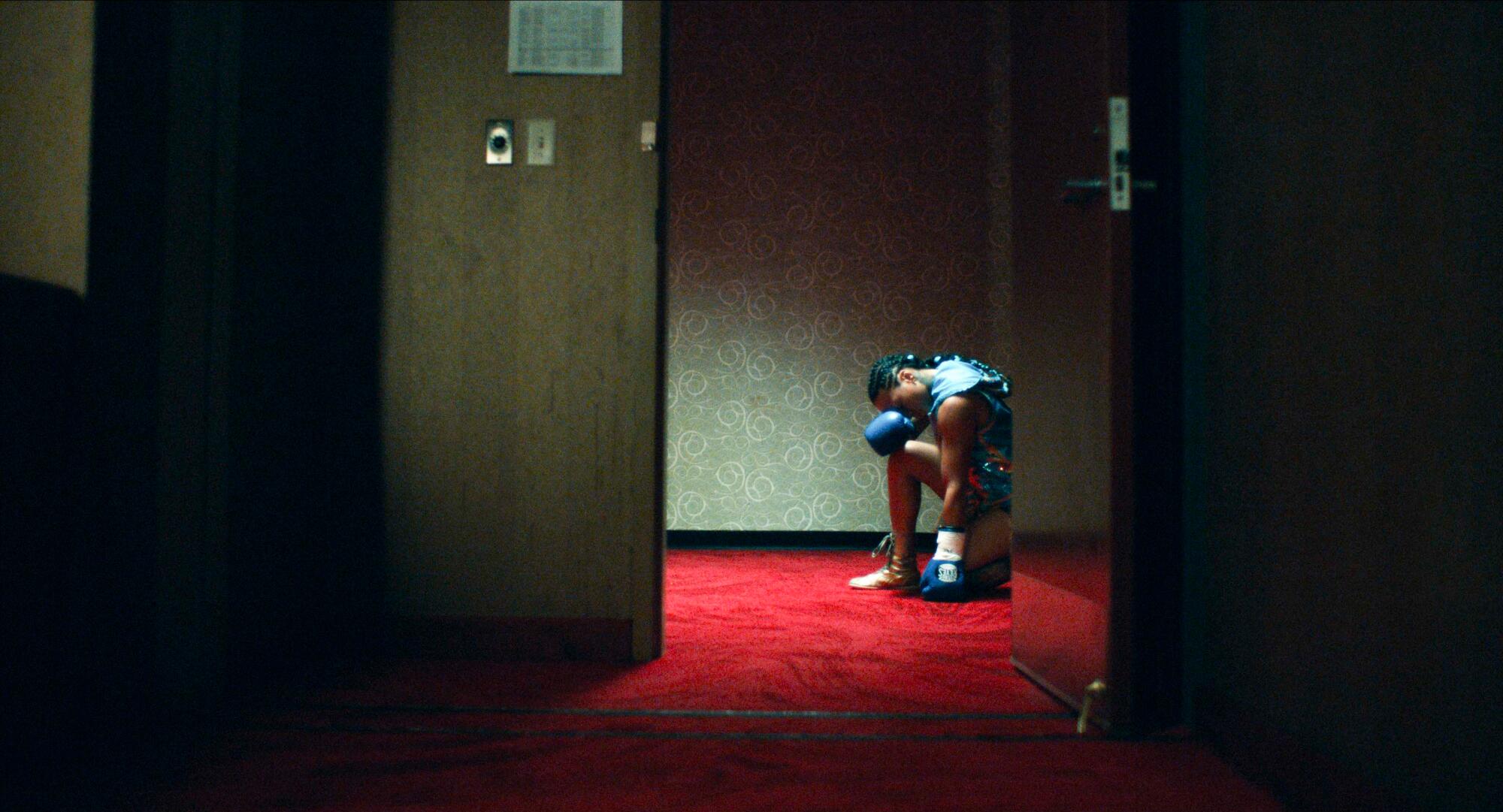
- Share via
At the age of 13, Kali “K.O. Mequinonoag” Reis found refuge in a boxing gym, the only place she could calm her mind amid a tumultuous adolescence. But it wasn’t until the Providence, R.I.-born world middleweight champion fought her way through hard-won battles as an adult that she found herself as a storyteller, finding new ways to share her personal journey and Native pride.
On March 6, boxing’s first Indigenous American female world champ faces a new challenge: vying for the female lead prize at Film Independent’s 2022 Spirit Awards. She’s nominated for her acting debut in the indie thriller “Catch the Fair One,” which she also co-wrote with director Josef Kubota Wladyka.
Carving out new spaces for herself is nothing new to the Seaconke Wampanoag and Cape Verdean fighter and Native rights advocate. She’s been doing it her whole life. “From where I’m from, I’m not supposed to be a world champion,” says Reis, 35, Zooming in from her current home base of Philadelphia.

“Especially being from the Northeast Woodlands area, where the first contact tribe was damn near all destroyed — growing up in the culture and heritage, but my mother also being Christian and me being two-spirit, there was a lot of ‘I’m not good enough, I’m not Black enough or Cape Verdean enough, I’m not Native enough, or my hair is curly and not straight enough, I’m confused about my sexuality and I’m not Christian enough,’” she said. “It was just so much ‘I didn’t belong.’ I was always fighting for something, fighting for acceptance.”
Each chapter of her life has been a story unto itself. Professionally Reis has amassed big wins and historic milestones, including title fights in two weight classes and the first female bout to be televised live on HBO. Inspired in part by the powwows she’d go to as a child with her mother, she enters arenas with traditional Indigenous dancers and music, using the motto “Fight 4 All Nations” as both tribute and testament to the roots she represents and how far she came to get here.
Now, having boxed for more than half her life, Reis is charting a new path for herself with “Catch the Fair One.” The crime thriller, now available on demand and also in limited theatrical release, borrows from elements of her own life to tell the story of a boxer infiltrating a sex-trafficking ring in search of her missing younger sister. Fellow boxer Shelly Vincent also makes her acting debut in the film, with a cast that includes Daniel Henshaw, Kevin Dunn, Kimberly Guerrero, Lisa Emery, Michael Drayer, Mainaku Borrero and Tiffany Chu.
Fresh from the gym Reis recently opened with her manager-husband, whom she wed last fall following her November WBA, WBO and IBO unification victory over Canadian boxer Jessica Camara, the budding movie star is quick to point out that, in addition to hailing from a family of musicians, singers and painters, she’s always been an artist herself. “Boxing itself is an art,” Reis said with a smile. “It’s beautiful chaos.” It’s also what led to the pro fighter’s extraordinary entrance into movies.
It was 2017 and Reis had already been thinking about parlaying her sports career into acting. But how? Book an Everlast commercial? Google “How to break into Hollywood”? Then Wladyka, who’d seen Reis through a friend’s boxing gym’s social media, slid into her DMs with a feature film (2014’s “Manos Sucias”) and TV directing credits to his name, hoping to connect.
It wasn’t the first time a filmmaker had reached out wanting to cast Reis in a project, but this one felt different. Impressed by her power and presence in the ring as well as her activism, Wladyka sent over the barebones script for his second feature and came to Rhode Island, camera in hand, to shadow and work with Reis as she trained.

“For me it was always about Kali,” said Wladyka. “When it really comes down to it, I just wanted to put this mixed Indigenous two-spirit warrior at the head of this movie. Because if people see her, she’s going to get cast in other stuff. She’s on her way. And the Spirit Award [nomination], to me, is the biggest. It makes me the happiest that she’s being recognized because she’s an extremely talented, special person and her story and her voice should be heard.”
The two clicked, united in the desire to raise awareness for the missing and murdered Indigenous women crisis across the Americas. They shared the experience of being biracial kids from single-parent families with close sibling relationships — Reis from a mixed Indigenous background, Wladyka with Polish and Japanese heritage — as well as a certain disposition. “He’s an OCD Virgo like I am,” said Reis.
Over the next two years, as Reis’ boxing career continued and Wladyka directed series including “Narcos,” “Fear the Walking Dead” and “The Terror,” a deep bond formed as they workshopped the indie project together. “We made agreements that we were going to talk about our lives but be really honest with each other, so we could build this trust,” said Wladyka.
Borrowing from aspects of Reis’ life and drawing from accounts she’d heard while visiting different reservations, the pair built out the story of Kaylee “K.O.” Uppashaw, an ex-boxer and addict living on the margins, estranged from her mother (Guerrero) two years after the disappearance of her sister Weeta (Borrero). When a private investigator finds a lead, Kaylee turns to her former trainer (Vincent) as she prepares to take on a network of traffickers in a desperate search for her sister.
“All the people who lost their loved ones and there’s no closure, that’s what we kept coming back to — the feelings of regret, the pain, the guilt, the rage,” said Wladyka. “And we wanted to put those feelings on the shoulders of this character.”
Despite Reis’ lack of professional acting experience, Wladyka’s goal was always for her to carry the film as its star. “He saw something in me I refuse to try to even see myself,” Reis said. “That’s been a common theme of my life, especially when I first started boxing — I didn’t think I was worthy of being that good. I was like, ‘I don’t know how good I’ll be. But because you trust me, I respect that, so I’m gonna give you my all.’ You feel energy when you first meet people. I knew he was genuine.”
To get the film financed without big names, it was Wladyka who had to fight.

Working with fellow producers Mollye Asher (an Oscar winner for “Nomadland”) and Kimberly Parker, with whom he and editor Benjamin Rodriguez completed a NYU MFA program under Spike Lee, he presented preshot scenes and footage that he’d shot with Reis. Private investors came aboard, as did executive producer Darren Aronofsky and his Protozoa Pictures, allowing the filmmakers to tell the tough and at times bleak story they wanted without pulling any punches.
“It is so important to acknowledge that we were able to make a bold, authentic, meaningful film because we didn’t have to fit our film into a box,” Asher and Parker said over email, adding that crucial support came from the Seneca Nation of Indians, who provided production resources, talent and locations for the shoot.
What excited the Oscar-nominated Aronofsky (“Black Swan”) was the opportunity to amplify the kind of voice and perspective seldom seen onscreen. Plus, Wladyka proved he could blend social realism with hardboiled genre elements in his previous films, “a really effective way to tell important stories without sacrificing tension or drama.”
To Aronofsky, it was clear Reis had to be the lead from the start. “I don’t think there was any doubt that she had to be our K.O.,” he said. “She’s got this great mix of strength and warmth, and it allows for her really tough character to have this kind of special vulnerability. I don’t think it’d feel like the same story without Kali as the lead. She’s a part of the film’s DNA.”
Filmed in 2019 in snowy Buffalo, N.Y., “Catch the Fair One” makes use of Reis’ physicality as Kaylee places herself in increasing peril to find her sister. Her performance is a largely interior one, carrying unspoken pain and rage in her body — “that common energy of, ‘I’m sorry for existing, I’m just trying to hide,’” as she described it. “The type of energy that I as an Indigenous woman and I’m sure many feel without even saying it.”
Playing Kaylee, and being able to shed her at the end of the shoot, was cathartic. “It’s a weird, odd, sad, somber, empty feeling,” Reis said of her character. “She was very much a part of me, but I’m so glad to have the opportunity to do it where I was able to ground myself in the me now and honor her, honor that part of me.”

The film, however, doesn’t rely on her boxing prowess to turn its stark tale into an action movie with a pat happy ending. Reis and Wladyka zoom out from Kaylee’s raw and bruising journey to reveal the insidious larger systems at play, reaching from seedy motel rooms to the comfy suburbs and beyond to look deeper as she encounters complicit and menacing figures hiding in plain sight.
The filmmakers acknowledge that their approach to the material may not be for everyone. But they hope “Catch the Fair One” will amplify real-world conversations around missing and murdered Indigenous persons and the devastating impact felt by their communities, at a time when more Native-led film and TV projects are just beginning to gain traction in a Hollywood that has historically ignored them.
“We’ve toyed around with trying to talk about this issue in America,” said Reis. “I’d like to hope that because we took a big swing ... people are going to love it or hate it, but at least people are going to think about it and talk about it. We need to bring it to the surface, look at it, acknowledge it and heal. So I hope telling these stories and being so bold about it will help our future generations start telling our stories.”
Currently the WBA super lightweight champion with three titles under her belt, Reis has a big fight coming up this year — maybe the biggest of her career, facing off against U.K. fighter Chantelle Cameron on a date to be determined. And with “Catch the Fair One” as a springboard, Reis plans to simultaneously keep pursuing her acting career, to see how far she can go telling her own stories onscreen.
“We need to see more faces like this — more Indigenous, more Native, more mixed Native, more Cape Verdean — that our generation and future generations can get used to seeing,” said Reis. “I just want to be an inspiration. If you’ve got a story, tell it. If you have a dream, chase it. Whatever’s meant for me in this world will be, and boxing is not forever. I’ll be hanging them up within the next two years or so ... and we’ll see what happens.”
More to Read
Only good movies
Get the Indie Focus newsletter, Mark Olsen's weekly guide to the world of cinema.
You may occasionally receive promotional content from the Los Angeles Times.











